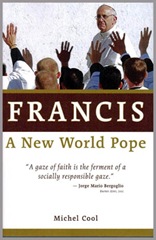Michel Cool. Francis: A New World Pope. Grand Rapids: Eerdmans, 2013. 128 pp. $14.00.
Why would an evangelical Protestant want to read a book on Pope Francis? This may be a question to consider before picking up French journalist Michel Cool’s recently published Francis: A New World Pope. After all, papal claims concerning “supreme, full, immediate, and universal power” are a problem for Protestants. But reading a book on the pope need not suggest one is prepared to kiss his ring. Most of us read books about all sorts of people with whom we disagree. In the case of the pope, however, there are particular reasons he deserves our attention.
It is valuable for us to understand the theology and mission of Pope Francis. First, whether we like it or not, the pope is, in a certain (global) sense, the single most significant Christian voice in the world. This was vividly illustrated in October 2007, for example, when a group of 138 Muslim leaders from the world-over published their letter to Christians, A Common Word Between Us and You. This letter was instigated by the pope’s lecture at the University of Regensburg, Germany, where the pontiff quoted from Manuel II Palaiologos, the 14th-century Byzantine emperor who cast aspersions on the violent legacy of Muhammad. Here is the point: when does the Muslim world ever speak with solidarity? It’s difficult to think of an example. But in response to the pope, lo and behold, it happened. It’s hard to imagine any other Christian leader exercising such far-reaching influence.
The other reason concerns the fascinating question of where the lines of continuity and difference fall between contemporary Catholics and Protestants. For example, our news headlines were recenty full of reports on America Magazine’s exclusive interview with Pope Francis. You will perhaps recall the interviewer’s first question, “Who is Jorge Mario Bergoglio?” to which the pope responded, “I am a sinner. This is the most accurate definition. It is not a figure of speech, a literary genre. I am a sinner.” Now perhaps I’m wrong, but I can’t quite imagine Paul III or Pius IX offering such an answer. But before our ecumenical juices begin to percolate too vigorously, we must also recognize ongoing areas of difference, not least of which is the ecclesially and soteriologically self-referential nature of the papal office itself.
Captivating from Cover to Cover
So what about Francis: A New World Pope? Michel Cool is a terrific writer, presenting delicious turns of phrase and captivating illustrations from cover to cover. Regan Kramer, who translated Cool’s French into English, should also be thanked for this work. The book’s overall message is concerned with revealing the person and mission of Pope Francis in terms of his journey to the papacy, his personality and convictions, his writings, and future prospects for his pontificate. Toward this end, the narrative offers numerous anecdotes intended to give an insider’s look at the man’s character and approach to ministry.
On a macro level, the book’s scope and sequence is a bit cumbersome, or maybe we should say “eclectic.” After the preface, Cool narrates the pope’s ascension to Peter’s throne (ch. 1). He then reflects on the 10 most pressing issues facing the new pontiff (ch. 2). Chapter three, “Pope Francis in His Own Words,” is perhaps the most engaging and may be worth the price of the book. While publishers burn the midnight oil translating the pope’s principal writings, this chapter provides excerpts from some of Bergoglio’s most significant speeches and texts. The fourth and final chapter, consisting of reflections on the pope’s legacy largely from his years as archbishop of Buenos Aires, Argentina, is equally illuminating.
Emerging from the pope’s motto—miserando atque eligando (“by making mercy and choosing [to practice it],” also sometimes translated “lowly but chosen”)—is a discernible theme that appears to run through the whole of Bergoglio’s life. This commitment to mercy is elucidated in numerous ways, including his regular advice to priests in Buenos Aires: “Practice mercy, have apostolic courage, and make yourself available to all” (14).
New World
It seems to me, however, there’s also a downside to Cool’s portrait. While presented in the context of the Bergoglio’s personal ministry, the book rarely explains the new pope with reference to the distinctively Catholic doctrines of the papal office, which, in Catholic terms, is the perpetual and visible source and foundation of the unity of the faithful. Such a reality must be remembered since papal claims and prerogatives constitute the seat of the pope’s ministry. In other words, we must remember this is Pope Francis about whom we are speaking. It’s easy for one to read the many Christ-centered and missionally sensitive quotes (e.g., “When we do not profess Jesus Christ, we profess the worldliness of the devil, a demonic worldliness” [69]) and forget that, inspiring as these statements are, they’re bound up with the conviction that only in communion with the Roman pontiff does one realize the fullness of Christian faith.
It may be a “new world” in which Pope Francis is serving, and his pastoral style, much like John XXIII before him, seems to be opening some ecclesial windows to allow an influx of fresh air. Unfortunately, however, from a Protestant point of view, the old problem of papal supremacy persists. Therefore, we “separated brethren” can use this occasion to pray that statements by the pope such as “I am a sinner” and “Christ is the one Savior of the whole man and of all men” (74) will penetrate the hearts of Catholics and somehow lead them to recognize the good news that we may go directly to Christ Jesus to have our sins forgiven and be embraced as children of God.





